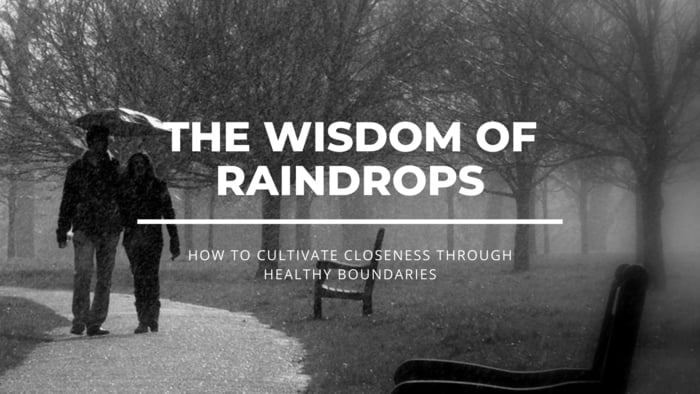“It is but a mere hairsbredth that separates one raindrop from another.”
– Talmud, Taanit, 9b
As the pandemic has taught us, maintaining a safe distance can be a way of showing that we care about others.
Social distancing and other types of healthy boundaries can keep us, and others, safe. We know this scientifically and we know this logically. The closer people get to one another, the more vulnerable they can become to each other in both positive and negative ways.
Sometimes closeness and vulnerability are healthy, and sometimes not: “There is a time for embracing, and a time to refrain from embracing” (Kohelet 3:5). There are times and situations that are appropriate to refrain from moving into another’s personal space and that’s a beautiful thing about healthy relationships – when there is respect for boundaries it creates the space necessary to cultivate nurturing and closeness.
Self-restraint and seperation
When someone forces themselves into the space of another person, it can be traumatic. What’s worse is that it makes the victim feel powerless and angry because something has been taken from them.
This is true no matter how severe, or seemingly trivial, the violation. Whether the breach was done with money, property, words, violence, or touch.
But when people respect the space of others by getting close only if, or when, appropriate, it creates an environment of growth. This can be seen in the natural world, too.
Raindrops and healthy space
“Nothing separates one raindrop from another raindrop but a hairsbreadth [of space]” (Talmud, Taanit, 9b).
In nature, the rain that comes showering from the sky in small packaged droplets is necessary for humanity to exist. Jewish prayer praises The Creator for the delicate way rain comes down calling it the “mightiness of rain” (גבורות גשמים) because it takes attention to detail and self-restraint to create the infrastructure for something as meticulously delicate as raindrops that don’t crash into one another.
But rain can also fall in ways that are destructive.
Floodwaters – violation of space
Since the natural world mirrors the spiritual world, during the time of Noah, when humanity began to fall in a magnitude that caused severe damage, so did the rain. The water in the natural just behaved similarly to human society.
According to the Kli Yakar, it was the invasion of others’ space that was the root cause of the famous Flood. People had become severely disrespectful of personal boundaries ‒ stealing, idolatry, and inconsiderate sexual behavior were considered ethical. It had become socially acceptable to steal in quantities small enough that the courts wouldn’t convict for ‒ just a few penny’s worth at a time. It became “ethical” to steal a nickel, a touch, a taste, a parking space, a pen from the office, hotel towels…
Society had become so disrespectful of space, and so intrusive, that people began to give up on the idea of healthy boundaries, so to speak. The Flood was just a natural, albeit tragic, result.
The light at the end of the rainbow
So far this post has mentioned a lot of sad stuff. So what’s the light at the end of the rainbow? Simply speaking, we can always learn to improve and get better. And the beautiful thing about that is, if you are reading this, that there is space in each of our lives to learn and grow through performing acts of lovingkindness, prayer, and tshuva.
The ideas presented above are based primarily on the Orach L’Haim chap 35 that explains that “all wise people should learn from the rain” and dedicate themselves to respecting the boundaries that have been Divinely given them.

